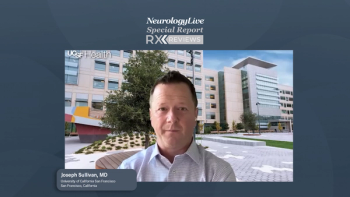
The senior research investigator at the New York Stem Cell Foundation discussed how human iPSC-based models can help dissect the cellular mechanisms underlying PIRA and progressive disability in multiple sclerosis. [WATCH TIME: 3 minutes]

The senior research investigator at the New York Stem Cell Foundation discussed how human iPSC-based models can help dissect the cellular mechanisms underlying PIRA and progressive disability in multiple sclerosis. [WATCH TIME: 3 minutes]

Joseph Sullivan, MD, discussed the evolving role of neurostimulation and surgery in managing drug-resistant epilepsies in adults, highlighting both practical limitations and emerging evidence.

Discover valuable insights and support for families navigating Dravet syndrome, emphasizing community connection and self-care for a hopeful journey.

The director of the Center for Clinical Ethics at Yale New Haven Health outlined how the AAN guidelines address the role of pharmacologic therapies in functional seizures, including what evidence exists and when medications should or should not be used. [WATCH TIME: 3 minutes]

Neurology News Network for the week ending January 31, 2025. [WATCH TIME: 4 minutes]

Families navigate the profound challenges of Dravet syndrome, balancing caregiving, emotional strain, and the quest for quality of life.

Parents navigate the complexities of epilepsy treatment as their children transition to adulthood, balancing medication and developmental needs.

Joseph Sullivan, MD, discussed the evolving recognition of genetically defined developmental and epileptic encephalopathies in adults and the importance of genetic testing for undiagnosed patients.

The director of the Center for Clinical Ethics at Yale New Haven Health provided insights on newly published guidelines for functional seizures, stressing the reasons for systemic psychiatric assessment and careful seizure characterization. [WATCH TIME: 3 minutes]

A duo of experts from CureDuchenne discussed how the inclusion of Duchenne muscular dystrophy on the Recommended Uniform Screening Panel can enable earlier diagnosis and inform decision-making in a rapidly evolving therapeutic landscape. [WATCH TIME: 7 minutes]

The associate chief medical officer at Michigan State University highlighted advances in neuromuscular disease, emerging therapeutic strategies, and the growing role of patient-reported outcomes at AANEM 2025. [WATCH TIME: 2 minutes]

A forward-looking discussion on cardiac monitoring strategies, real-world data, and how vamorolone may apply across Duchenne and Becker muscular dystrophy.

The chief medical officer at Xenon Pharmaceuticals provided clinical insights on promising long-term, phase 2 data testing azetukalner, a first-in-class Kv7 channel opener, in patients with focal onset seizures. [WATCH TIME: 4 minutes]

The consultant neurologist at the National Neuroscience Institute discussed how artificial intelligence, biomarker development, and drug repurposing can help improve patient care in ALS. [WATCH TIME: 4 minutes]

Neurology News Network for the week ending January 24, 2025. [WATCH TIME: 4 minutes]

Pediatric specialists stressed that the future of epilepsy care may involve embedding behavioral health clinicians in specialty clinics to identify and treat depression early, improve quality of life, and potentially reduce seizure burden. [WATCH TIME: 3 MINUTES]

A panelist discusses how tavapadon’s safety profile may offer advantages over higher doses of levodopa and traditional D2/D3 dopamine agonists by potentially reducing the incidence of dose-related adverse effects while maintaining symptom control.

A panelist discusses how efficacy data from the TEMPO clinical trials suggest that tavapadon demonstrates promising benefits as both a monotherapy and adjunctive therapy to levodopa in adults with Parkinson disease.

The professor of geriatrics and gerontology at the University of Wisconsin shared insights on prescribing the autoinjector formulation of lecanemab for patients living with Alzheimer disease. [WATCH TIME: 5 minutes]

Explore the importance of collaborative treatment approaches for managing epilepsy, emphasizing open communication between families and healthcare providers.

Parents navigate the complexities of genetic testing and Dravet syndrome, sharing insights on the importance of timely and informed medical support.

Joseph Sullivan, MD, discussed the importance of genetic testing and documenting findings to guide treatment and support smooth transitions from pediatric to adult care.

The senior director at the Banner Alzheimer's Institute talked about findings from the ancillary analyses of the US POINTER Study and the importance of strong recruitment efforts. [WATCH TIME: 5 minutes]

The head of search and evaluation at the Alzheimer's Drug Discovery Foundation discussed the evolving role of biomarkers for diagnosis and the progress of targeted therapies in Alzheimer disease. [WATCH TIME: 5 minutes]

In this segment, Wittlieb-Leber examines how vamorolone trials address long-standing questions about steroid exposure, cardiac risk, and meaningful cardiac endpoints in Duchenne.

The chief operating officer at Linus Health talked about how brief, digitally administered cognitive assessments enable scalable, earlier identification of cognitive impairment. [WATCH TIME: 4 minutes]

Pediatrics specialists discussed approaches to assessing depressive symptoms that may overlook key risk factors, highlighting the need for improved self-report measures, developmentally appropriate tools, and more precise symptom characterization. [WATCH TIME: 3 MINUTES]

The director at the National Center of Neurology and Psychiatry discussed how biomarker-driven diagnostics and antibody therapies targeting amyloid pathology may be reshaping Alzheimer disease management. [WATCH TIME: 4 minutes]

Pediatrics specialists discussed key methodological limitations of a recently published study, including variability across sites, reliance on caregiver-report measures, and the lack of developmentally appropriate tools for assessing depression in youth with intellectual disabilities. [WATCH TIME: 4 MINUTES]

Pediatric specialists reflected on the challenges and gaps in assessing depressive and anxiety symptoms among youth with epilepsy, emphasizing that patients with lower IQs are often excluded from research and clinical screening. [WATCH TIME: 3 MINUTES]